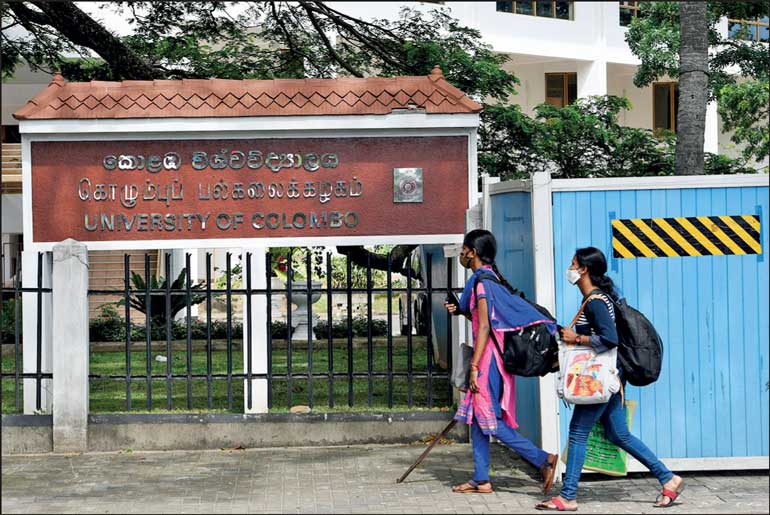Wednesday Feb 25, 2026
Wednesday Feb 25, 2026
Wednesday, 4 August 2021 00:02 - - {{hitsCtrl.values.hits}}

If policy makers are to take student employability seriously, there is a need for a comprehensible research approach that could help align the higher education sector with the country’s economic and social requirements – Pic by Shehan Gunasekara
 With the rise of COVID-19, the world is facing its greatest health crisis since the Spanish flu pandemic, which over a century ago killed about 20 to 50 million of the world’s population. Sri Lanka is feeling the brunt of COVID-19 with an unprecedented foreign exchange management challenge that could have an adverse impact on the economy and jobs unless right remedies are adopted to handle the situation.
With the rise of COVID-19, the world is facing its greatest health crisis since the Spanish flu pandemic, which over a century ago killed about 20 to 50 million of the world’s population. Sri Lanka is feeling the brunt of COVID-19 with an unprecedented foreign exchange management challenge that could have an adverse impact on the economy and jobs unless right remedies are adopted to handle the situation.
The current context
For an extended period of time Sri Lanka has been experiencing low unemployment. In the last decade, unemployment, according to the statistics published by the Government, has been hovering below 5%.
However, the outdated syllabi in the almost monopolistic State-led higher education sector could soon create ripples in the country’s labour market, as the COVID-19 pandemic has exposed its vulnerabilities and exacerbated the need to create jobs to take the economy to a higher value chain.
Sri Lanka’s labour force is mainly broken up into the following sectors. According to Statista.com, almost 46% of employment is generated in the services sector, 30.4% in agriculture and 23% in the manufacturing sector.
The agriculture sector’s significance to employment has reduced from almost 32% in 2010 to just over 23% in 2020, despite billions by way of taxpayer handouts are directed towards the politically significant agri sector. Hence, Sri Lanka’s labour force is at crossroads of taking the timely decision to rapidly overhauling the education system or fall into a labyrinth of subsidizing of employment via government jobs.
There is no easy fix to this perennial problem. Post-independent Sri Lanka’s agri dependent economy suffered at the hands of two youth uprisings and a three-decade old brutal civil war that destroyed the economy. It has been argued that if employment were plentiful, the aforesaid would not have occurred.
During the uprisings and the commencement of the civil war, unemployment, according to government statistics, was high. During the period (1960 to 1980) Sri Lanka had sustained double digit unemployment, which was a major cause for student unrest. Even now seeing student protests during peak traffic hours is a common sight at the Lipton Circle and in front of the University Grants Commission in Ward Place with students demanding jobs for the free education they receive.
As I see it, this is a clear indication of a higher education system that has failed to be in sync with demands of the changing times and economic realities.
The solution
To understand the problem, the very definition of employability must be explored. While there are many definitions of employability, most include certain common aspects, which are linked to employability. Skills and knowledge, individual characteristics, personal circumstances, soft skills and other socio-economic factors can affect graduate employability.
The private sector is hiring more private university graduates than 10 years ago. The curriculum of these universities is up-to-date due to their overseas affiliations and produce comparatively well-rounded quality students that have the technical, social and vocabulary skills demanded by the modern workplace.
The first wave of university education reforms in Sri Lanka focused on granting university access to a higher number of qualified students every year by expanding the existing resources base at State universities and establishing new ones. The second wave of university education reforms in Sri Lanka now needs to focus on creating a university education system that produces quality graduates, who are able to adapt to the needs of the employers and society at large; in other words a system that is able to respond to the needs of the labour market.
Investment in university education involves huge financial resources, hence the universities need to respond to signals from the society to ensure that desired job qualifications and degree programmes offered are in alignment. While a university degree has both private and social returns, the reform agenda should move from supply-driven to demand-driven degree programmes.
Bridging the skill divide
Demand-driven education reforms have been recommended by various experts as a strategy for university graduates to keep pace with the emerging competitive global economy, which is technology-infused and industry-driven.
This goes beyond the simple rhetoric being espoused in the local educational curricular where university graduates are often told to be job creators rather than job seekers. It is generally understood that, in practice, a conducive and supportive business climate created by the Government is key to job creation, and is quite apart from competencies and innovativeness of a country’s graduates.
To put this into a perspective, serious educational reforms and the overhaul of the Sri Lanka higher education should focus on employability development for all students, and to support a range of diverse students within higher education sector.
Further, increased use of personal development planning tools and careers advice should be assured to assist students in making connections between their career intentions and learning, working, co-curricular and extra-curricular activities.
This approach connects labour market opportunities, personal development and aspirations, skills development, career management and learning to support and inform students about the possibilities that exist for them.
Industry participation
Despite a few examples of private industry collaborating with the higher education sector, Sri Lanka needs more of it. Partnership is a win-win situation for both parties as the university or at least the respective department can make the necessary amendments to the status quo to develop graduates with the required skills and even the attitudes to be employable.
The internship progammes that may follow could bring a different perspective to the student who is influenced by various revolutionary pundits that waste their time and resources and ultimately drive them to protest demanding jobs from the State sector.
The MAS-Dialog-Hemas summer internship programme is one such fine example of introducing and preparing students to corporate Sri Lanka. Started in 2004, the six-week programme places students in their respective area of study to gather knowledge and give feedback to their peers on the experience they have gained. The students who impress the companies the most are given offer letters at graduation.
This is what needed, and Sri Lanka needs more of it to be more competitive in future, as in a more connected world employability is determined by how well we compete to be part of the world supply chain. Attracting leading global universities to set up shop in Sri Lanka—similar to Singapore—is also another way to improve the employability of the local graduate, as well as toretain a significant outflow of foreign exchange.
In conclusion
If policy makers are to take student employability seriously, there is a need for a comprehensible research approach that could help align the higher education sector with the country’s economic and social requirements.
It is vital, in an increasingly competitive labour market, that students graduate with all the qualities necessary to gain and retain fulfilling employment. Particularly, for Sri Lanka to gain the full benefit from Port City project, higher education reforms remain paramount to produce the type of graduates with the right skills and attitudes to be employed by the multinational companies that may set up business in this piece of reclaimed land.
(The writer is the CEO/General Manager of People’s Bank)